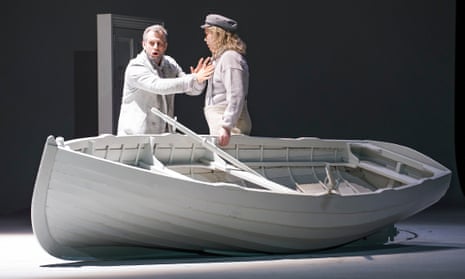Many operas end with tragedy but are about life and hanging on to the last. The entire burden of Georg Friedrich Haas’s Morgen und Abend is death itself. It roars into action with a cacophony of thunderous drumming, then yields to ever shifting clouds of scudding sound. Stark and spare, with a glistening score and a brave absence of action, this 90-minute work tries to read the world from the other side. A man has just died but he still has a conscious mind. The opera charts his dawning realisation of his nonexistence and guesses at what happens after his last breath. “Let’s just say you’re not quite there,” as Beckett said to his star actor Billie Whitelaw during rehearsals for Footfalls (1975), a play that shares some of the same uneasy terrain.
Opera has no boundaries, but Morgen und Abend, a Royal Opera House co-commission and co-production with Deutsche Oper Berlin, pushes the form in its own unflinching way. It’s a meditation. If you want the conventions of melodrama, it will send you to the little-green-man exit screaming. Plot, meaning, action are at once elusive and plumb obvious. Three things happen: offstage a baby, Johannes, is born. We meet him only when he walks through the door a grey-haired man, luminous in white, already dead. As in The Winter’s Tale, “The statue is but newly fix’d, the colour’s/ Not dry”. His wife and a friend, Peter, welcome him to the afterlife while his daughter, still alive, mourns him. The end.
Graham Vick was the sage choice as director of this world premiere, the first of several new Royal Opera commissions, with works by Thomas Adès, Unsuk Chin and others in the pipeline. Vick’s staging is flawless and tender. Matching his approach, his regular collaborator, Richard Hudson, has designed a set with no scenery and a few props, all in chalky colours (we can all now chant the smart paint-chart shades: strong white, great white, off-white, on-white, dimity, dimpse… only one of those is made up). Bed, door leading nowhere, shopping trolley, chair, umbrella and fishing boat all give an impression of cold petrification. Each object occupies its own space on a revolve so slow-moving you do not notice until suddenly things are not where they were. Lighting, by Giuseppe Di Iorio, and projected text by 59 Productions in elegant lettering on a blank wall behind the action, complete the coherent whole.
The text, based on a novel by the Norwegian writer Jon Fosse who has made his own libretto, is concise, unadorned. As with Beckett, womb and tomb are almost one, the space and time between them gone in the blink of an eye. I don’t know where Haas stands theologically: I have read that he is Protestant, that he is Catholic and that he is nothing at all. Whichever, he certainly occupies a spiritual domain of his own, with emotion expressed through music as the guiding force. As a listener, you can ponder grief itself and concentrate on the score. That turns out, after two encounters with Morgen und Abend, to be a rewarding option.
Born in Austria in 1953, Haas grew up in a mountainous region near the border of Switzerland where, he has said, the sun never penetrated the narrow valley and nature was a dark force. That darkness overwhelmed some of his earlier works, but increasingly light has become a raison d’être as the titles alone indicate: Hyperion, a Concerto for Light and Orchestra (2006) or the piano trio ins Licht (2007). This new opera almost blinds us with its aural brilliance. Haas uses a large orchestra, with a rich panoply of spangly percussion – glockenspiel, crotales, gongs, vibraphone – as well as an accordion and plenty of low woodwind and brass.
The writing is minutely layered, a wordless, unseen chorus at times divided into six voice parts (mezzo and baritone added to soprano, alto, tenor, bass). At one point the strings are split into 22 sections, instead of the usual four, so that their washes of glissando sound endless. Haas instructs on every detail, from how the slow trills are played to the staggered breathing of the chorus or the bow changing of the strings to achieve a single, glassy surface, uninterrupted and mesmerising.
Michael Boder, conducting, does a fine job in keeping this sheen of aural colour together, with tireless input from the ROH orchestra. At both performances I saw, the actor Klaus Maria Brandauer, who opens the work, was hard to hear, which made the first 15 minutes an endurance test for the impatient. Christoph Pohl finds warm humanity in the role of Johannes. Sarah Wegener as the daughter, Will Hartmann as the fisherman friend Peter and Helena Rasker as the wife gave committed and telling performances.

“A man with convictions finds an answer for everything. Convictions are the best form of protection against the living truth.” These words of the Swiss playwright Max Frisch have never been more fitting than now. His play Biedermann and the Arsonists (seen at the Royal Court in 2007 starring Benedict Cumberbatch) has been made into an opera by the Austrian-Czech composer Šimon Voseček (born 1978) and premiered by Independent Opera as part of its 10th-year celebrations. The noisy, relentless score was superbly played by the Britten Sinfonia conducted by Timothy Redmond.
An indefatigable Mark Le Brocq led a sterling cast as the bigoted businessman Biedermann who falls prey to two arsonists (the excellent duo of Leigh Melrose and Matthew Hargreaves). The young director Max Hoehn, one-time assistant of Graham Vick, made a lively, inventive show. Arson, firemen, police, emergency services, sirens and menace, even in the name of absurdist comedy, were not what any of us felt like laughing at last week. It’s a credit to all concerned that we managed to, right through to the anticipated cataclysm.
Star ratings (out of 5)
Morgen und Abend ****
Biedermann and the Arsonists ***

Comments (…)
Sign in or create your Guardian account to join the discussion